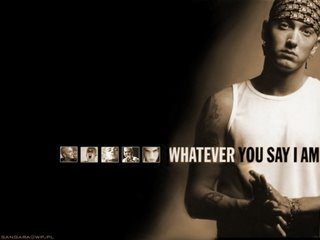Eminem's tattoos
Published Friday, June 02, 2006 by WHOSANE.EMINEM’S TATTOO: Rot in Pieces
 Center Of Belly Tattoo : "Rot in Pieces"
Center Of Belly Tattoo : "Rot in Pieces"This tattoo is aimed at Eminem's (divorced) wife Kim Scott. he had it done one night after a fight with Kim, assuming he would never get back together with her. It shows a picture of an open grave with the words "Rot in Pieces" below.
EMINEM’S TATTOO: D
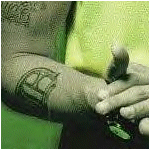 Lower Right Arm Tattoo : "D"
Lower Right Arm Tattoo : "D"This tattoo is the first part of the D12 logo which Em has tattooed across each lower arm.
There is also a tattoo below this saying "Slit Here".
EMINEM’S TATTOO: 12
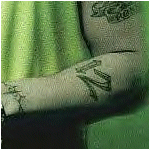 Lower Left Arm Tattoo : "12"
Lower Left Arm Tattoo : "12"This is the second part of the above tattoo.
Below the "12" there is also a gothic style bracelet on his wrist which he had done whilst drunk.
EMINEM’S TATTOO: Hailie Jade + Bonnie & Clyde
 Upper Right Arm Tattoo :
Upper Right Arm Tattoo :This tattoo is a portrait of Eminem’s daughter, Hailie Jade, with some roses around her. It also has the words "Bonnie & Clyde", which was also a song on The Slim Shady LP, and which was also dedicated to his daugther.
Before getting this tattoo done, he had a tattoo here which simply said "Eminem".
EMINEM’S TATTOO: Hailie Jade
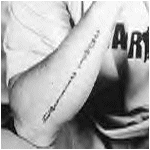 Back Of Lower Right Arm Tattoo: "Hailie Jade"
Back Of Lower Right Arm Tattoo: "Hailie Jade"Eminem got this tattoo done when his baby girl was born on Christmas day 1995.
EMINEM’S TATTOO: Uncle Ronnie
 Upper Left Arm Tattoo :
Upper Left Arm Tattoo :Eminem got this tattoo as a mark of respect for his uncle, Ronnie Pilkington, who committed suicide back in 1991. Eminem was much closer to his uncle, who first introduced him to HipHop, than anyone else in his family and often includes uncle Ronnie in some of his lyrics.
Eminem Biography
Published by WHOSANE.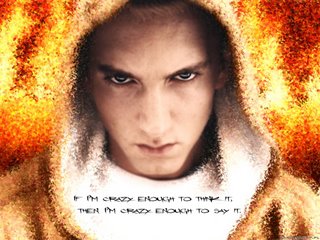 Eminem biography 1
Eminem biography 1 Eminem, born Marshall Bruce Mathers III, 17 October 1973, Kansas City, Missouri, USA. This white rapper burst onto the US charts in 1999 with a controversial take on the horrorcore genre. Mathers endured an itinerant childhood, living with his mother in various states before eventually ending up in Detroit at the age of 12. He took up rapping in high school before dropping out in ninth grade, joining ad hoc groups Basement Productions, the New Jacks, and D12. The newly named Eminem released a raw debut album in 1997 through independent label FBT. Infinite was poorly received, however, with Eminem earning unfavourable comparisons to leading rappers such as Nas and AZ. His determination to succeed was given a boost by a prominent feature in Source's Unsigned Hype column, and he gained revenge on his former critics when he won the Wake Up Show's Freestyle Performer Of The Year award, and finished runner-up in Los Angeles' annual Rap Olympics. The following year's The Slim Shady EP, named after his sinister alter-ego, featured some vitriolic attacks on his detractors. The stand-out track, "Just Don't Give A fuck", became a highly popular underground hit, and led to guest appearances on MC Shabaam Sahddeq's "Five Star Generals" single and Kid Rock's Devil Without A Cause set. As a result, Eminem was signed to Aftermath Records by label boss Dr. Dre, who adopted the young rapper as his protege and acted as co-producer on Eminem's full-length debut. Dre's beats featured prominently on The Slim Shady LP, a provocative feast of violent, twisted lyrics, with a moral outlook partially redeemed by Eminem's claim to be only "voicing" the thoughts of the Slim Shady character. Parody or no parody, lyrics to tracks such as "97 Bonnie & Clyde" (which contained lines about killing the mother of his child) and frequent verbal outbursts about his mother were held by many, outside even the usual Christian moral majority, to be deeply irresponsible. The album was buoyed by the commercial success of the singles "My Name Is" and "Guilty Conscience" (the former helped by a striking, MTV-friendly video), and climbed to number 2 on the US album chart in March 1999.
Eminem subsequently made high profile appearances on Rawkus Records' Soundbombing Volume 2 compilation and Missy "Misdemeanor" Elliott's Da Real World. He was also in the news when his mother filed a lawsuit claiming that comments made by the rapper during interviews and on The Slim Shady LP had caused, amongst other things, emotional distress, damage to her reputation and loss of self-esteem. None of which harmed the sales of Eminem's follow-up album, The Marshall Mathers LP, which debuted at number 1 on the US album chart in May 2000 and established him as the most successful rapper since the mid-90s heyday of 2Pac and Snoop Doggy Dogg. By the end of the year, however, his troubled personal life and a serious assault charge had removed the gloss from his phenomenal commercial success. Despite criticism from gay rights groups, the rapper swept up three Grammy Awards the following February. He also reunited with his D12 colleagues to record the transatlantic chart-topping Devil's Night.
Eminem's new studio album, The Eminem Show, was premiered by single "Without Me". The track, which debuted at UK number 1 in May 2002, featured a sample from Malcolm McLaren's "Buffalo Girls" and was supported by a controversial video which saw the rapper dressing up as Osama Bin Laden. The album debuted at number 1 on both sides of the Atlantic. Later in the year, Eminem made his mainstream acting debut in 8 Mile. The lead single from the soundtrack, "Lose Yourself", gave the rapper his first US number 1 single in November.
Eminem biography 2
Although he's only been in the public eye since 1999, Marshall Mathers (aka Eminem) has crammed at least a decade's worth of career highs and lows into those few short, high-profile years. The Detroit-based Dr. Dre protégé has invoked the wrath of women and homosexuals with his offensive lyrics; become enemies with Moby, Everlast, Fred Durst, and Christina Aguilera; provided tabloids with plenty of gossip fodder regarding his personal life...and in the process become just about the biggest rock star on the planet. This is because Eminem isn't just about controversy and shock value: This often misunderstood major talent has actually given white rappers genuine credibility in this post-Vanilla Ice age with his string of dynamic hits (both solo and with his side group, D12), his plethora of Grammy nominations, his critically acclaimed film 8 Mile, and his three multiplatinum studio albums, which--once one gets past the hype and hullabaloo that surround them--are some of the most creative, original, and exciting releases of the rap genre (or any musical genre) in the past decade.
Mathers was born into a poor, working-class family on October 17, 1972 in St. Joseph, Missouri, though he spent much of his youth in Detroit, the city he would eventually put on the rap map. Originally taking on the stage name M&M (later changed to its current spelling), at age 14 he became a battle rapper, competing against other Detroit MCs in local clubs. After a short stint with a rap act called New Jacks, in 1995 he made his recording debut with a group called Soul Intent, which introduced him to a rapper named Proof, who appeared on that single's B-side. Eminem and Proof soon started a new group called D12 with four other MCs (Bizarre, Kon Artis, Swift, and Kuniva), while Eminem simultaneously launched his solo career with two independent releases, 1996's Infinite and 1997's The Slim Shady EP, which featured his trademark dark, disturbing, angry lyrics. Eminem drew from his troubled personal life when penning such bleak words: He had just had a daughter with his on/off girlfriend, Kim, with whom he had a very tumultuous relationship; he was estranged from his mother, with whom he also frequently butted heads; he was abusing alcohol and drugs with alarming frequency; and he had attempted suicide on at least one occasion. Though these harrowing experiences provided inspiration for some brilliant if nasty and offensive lyrics, Mathers was at such a low point in his life that it seemed there was nowhere to go but up.
Enter Interscope Records honcho Jimmy Iovine, who--impressed by Eminem's fresh and bold style--approached the struggling rapper after seeing him take second place in the freestyle category at 1997's Rap Olympics. Iovine later played Eminem's demo tape for super-producer and former Death Row Records chief/NWA member Dr. Dre, who immediately liked what he heard, contacted Eminem, and started a fruitful creative partnership with Eminem that exists to this day. (Legend has it that the two recorded Eminem's first big hit single, "My Name Is," within an hour after first meeting each other.) Interscope quickly signed Mathers, and Dre produced his major-label debut album, The Slim Shady LP, which was released in February 1999 to both massive acclaim and derision, eventually going triple-platinum.
Eminem's follow-up, 2000's Marshall Mathers LP, was an even bigger phenomenon, selling almost 2 million copies in its first week of release alone, thus becoming the fastest-selling hip-hop album of all time. However, the album stirred up even more of an uproar than its predecessor, making Mathers the target of much public hatred. Among other conflicts and controversies, the album created a feud with pop princess Christina Aguilera (the single "The Real Slim Shady" alleged that she had performed oral sex on both Limp Bizkit's Fred Durst and MTV's Carson Daly); led his mother to file a defamation lawsuit against him (a judge later dismissed the case); and generated accusations of homophobia and sexism mostly centering around the songs "Kill You" and "Kim" (the latter a rant about the mother of his child, whom he had recently married but would soon divorce, and later reconcile with yet again). But Eminem thrived on the controversy, becoming an even bigger superstar and racking up a surprising number of Grammy nominations in 2001, much to the chagrin of his many outspoken detractors. And he kept people guessing about how much of the Slim Shady "character" was really the real deal, when he performed a duet version of his single "Stan" with the openly gay Elton John at the Grammys ceremony, even warmly hugging Elton onstage. Mathers won three Grammys that night--Best Rap Solo Performance (for "The Real Slim Shady"), Best Rap Performance By A Duo Or Group (for his work on the Dr. Dre duet "Forgot About Dre"), and Best Rap Album (for The Marshall Mathers LP)--adding to the two statuettes he'd won the previous year for "My Name Is" (Best Rap Solo Performance) and The Slim Shady LP (Best Rap Album).
There seemed no stopping Eminem--not even convictions on weapons and assault charges (stemming from separate incidents involving his estranged wife with another man and rival Detroit rap act Insane Clown Posse). Eminem was sentenced to community service and kept on recording, releasing Devil's Night with old group D12 in 2001 and then The Eminem Show, one of the most critically heralded albums of 2002 and his most personal work yet. He also revealed more of his real-life persona in 8 Mile, a Rocky-style feelgood flick lensed by L.A. Confidential/Wonder Boys director Curtis Hanson that presented a sort of cleaned-up version of Eminem's rags-to-riches life story. Eminem put on such an impressive performance in the film that there was actually speculation that he would receive a Best Actor nomination at the Oscars in 2003.
While Eminem may have seemed like a novelty act at first--with his shocking, four-letter lyrics, cartoonish bad-boy image, and, of course, pale skin color (a real anomaly in hip-hop)--he has since established himself as one of the most important artists of his time and a true force to be reckoned with, continuing to cross both color boundaries and genre boundaries with his edgy, rock-tinged raps. With his turbulent personal life, powder-keg temper, and tendency to tangle with the law, it is still uncertain how long his career will last before he burns out, but it's already obvious that his music had made history and will long outlast any controversy that dogs him.
- Lyndsey Parker
Eminem biography 3
In a few short months, Eminem has gone from being one of the most heralded emcees in independent hip-hop to one of the most provocative, controversial rappers in contemporary pop music. The overnight success of his debut album, The Slim Shady LP, literally rocked the rap world, making him one of the biggest music success stories of 1999. But Eminem is more than the latest rap artist to blow up. He's spent the last several years paying his dues, and his lyrics, which cover topics such as poverty and single parenthood, reflect a rough upbringing. His unlikely acceptance by the pop mainstream has made some wonder how his popularity will affect the future of hip-hop music.
Before he had the world singing along to "My Name Is …," he was Marshall Mathers, a poor kid growing up in Warren, Mich. "It's like the real, stereotypical, trailer park, white trash," Eminem told Rap Pages earlier this year. As a child, he and his mother moved constantly, staying at relatives' homes in places as disparate as Warren and Kansas City, Mo. As a result, Marshall found it difficult to make friends, and he retreated into his comic books and television. "I didn't really start opening up until eighth grade, going into ninth," he said.
When Mathers was 12, his mother finally settled down on the east side of Detroit. There, he attended Lincoln Junior High School and Osbourne High School, hanging out with friends and listening to artists like LL Cool J and the 2 Live Crew. He battled against other rappers at his high school, and quickly gained a reputation as a nimble rhymer. But his penchant for skipping school led him to fail the ninth grade. After dropping out of high school, he held down several odd jobs, while continuing to work on his craft. "I tried to go back to school five years ago," he said, "but I couldn't do it. I just wanted to rap and be a star one day."
Mathers rapped in several groups such as Basement Productions, the New Jacks, and Sole Intent, before deciding to go solo. In 1997, he released an album, Infinite, through a local company called FBT Productions; it was met with derision from the local hip-hop community. "I was getting a lot of feedback saying I sounded like Nas or Jay-Z," he admitted. Despite the criticism, Eminem continued to promote himself through shows and appearances at radio stations and freestyle competitions across the nation. His perseverance garnered him a notice in the Source's influential "Unsigned Hype" column. Later that year, he won the 1997 Wake Up Show Freestyle Performer of the Year from L.A. DJs Sway and Tech, and earned second place in Rap Sheet magazine's "Rap Olympics," an annual freestyle rap competition.
In 1998, Eminem put out The Slim Shady EP, which contained the original version of "Just Don't Give A …" "Slim Shady is the evil side of me, the sarcastic, foul-mouthed side of me," he said during an interview with the Source. The EP made him an underground star, and Eminem was invited to appear on underground MC Shabaam Sahdeeq's "Five Star Generals" single, Kid Rock's Devil Without a Cause, and other rap releases. At the end of the year, Eminem put out a popular 12-inch, "Nuttin' to Do/ Scary Movies," with fellow Detroit rapper Royce the 5'9".
Meanwhile, a copy of The Slim Shady EP made its way into the hands of Dr. Dre, the legendary creator of The Chronic and N.W.A., and current president of Aftermath Entertainment. Dr. Dre quickly signed Eminem to his label, and the two began preparing The Slim Shady EP for a full-fledged release, adding songs like "My Name Is …" and "Guity Conscience." Early in 1999, Eminem made the world take notice with his charismatic video for "My Name Is …" parodying everyone from Marilyn Manson to the President of the United States. Shortly afterward, The Slim Shady LP debuted at No. 3 on the Billboard Album Chart. Its sensationalistic depiction of rampant drug use, rape, sex, and violence horrified some; equally disturbing was Eminem's various four-letter-word insults directed at his mother and songs like "'97 Bonnie and Clyde," where Eminem fantasized about killing the mother of his child.
In defense, Eminem claimed that he was just speaking his mind. "I do feel like I'm coming from a standpoint where people don't realize there are a lot of poor white people," he explained in the Source. "Rap music kept my mind off all the bulls--t I had to go through." His cynical take on life struck a chord with millions of rap fans, and drove The Slim Shady LP to double-platinum-plus sales. He began to tour, including a solo jaunt with the Beatnuts and Mixmaster Mike.
While most in the hip-hop community greeted Eminem with open arms, others took a more cautious approach, wondering why rock stations across the country who never played rap music added "My Name Is …" to their playlists. Was it because Eminem was the first "legitimate" white rapper to gain widespread popularity? "I'm white in a music started by black people. I'm not ignorant to the culture and I'm not trying to take anything away from the culture," he said in his defense. "But no one has a choice where they grew up or what color they are. If you're a rich kid or a ghetto kid you have no control over your circumstance. The only control you have is to get out of your situation or stay in it."
Throughout the year, Eminem has continued to record for other artists, making appearances on Sway and Tech's This or That compilation, DJ Spinna's Heavy Beats Vol. 1, Missy Elliott's Da Real World, the Soundbombing 2 compilation, and Dr. Dre's highly anticipated sequel to The Chronic, Chronic 2001: No Seeds. And in June and July of 1999, the rapper took to the road with the Warped tour, filling in for Cypress Hill, who decided to forgo the tour in favor of recording its next album.
After wrapping up his touring commitments, Eminem plans to take a short break before returning to the studio to record the follow up to The Slim Shady LP. In the meantime, he can bask in the glow of his many awards. Not only is he up for Best New Artist in the Source's Hip-Hop Music Awards, he also garnered four MTV Video Music Awards — "My Name Is …" nabbed nods for Best Male Video, Best New Artist, and Best Director, and "Guilty Conscience" earned him a Breakthrough Video nomination.
- Mosi Reeves, Wall Of Sound
Eminem biography 4
The average rapper wouldn't be able to grace the pages of Rap Pages, VIBE, Rolling Stone, Spin, The Source, URB and Stress and go on a national tour months before their major-label debut album is released. Then again, Eminem isn't an average rapper. He's phenomenal.
The impending release of the The Slim Shady LP, his first set on Aftermath/Interscope Records, already has underground hip-hop heads fiending for Eminem. Chock full of dazzling lyrical escapades that delve into the mind of a violently warped and vulgar yet extremely talented wordsmith, the 14-cut collection contains some of the most memorable and demented lyrics ever recorded.
For Eminem, his potentially controversial and undoubtedly offensive songs will strike a chord with a multitude of hip-hop loyalists who believe they have little to lose and everything to gain.
"I'm not alone in feeling the way I feel," he says. "I believe that a lot of people can relate to my shit--whether white, black, it doesn't matter. Everybody has been through some shit, whether it's drastic or not so drastic. Everybody gets to the point of 'I don't give a fuck.'"
Those words are more than just a slogan for the Detroit resident. "I Just Don't Give A Fuck" and "Brain Damage" are the two songs comprising Eminem's initial single from The Slim Shady LP. Each tune is sure to paralyze meek listeners with their relentless lyrical assault. Produced primarily by long-time collaborators FBT Productions, the Slim Shady LP also features beatwork from Aftermath CEO Dr. Dre. The N.W.A. alum handled beats for "My Name Is" (the second single), "Guilty Conscience" and "Role Model."
Dr. Dre was so impressed after hearing Eminem freestyling on a Los Angeles radio station that he put out a manhunt for the Michigan rhymer. Shortly thereafter, Dre signed Eminem to his Aftermath imprint and the two began working together. Thoroughly impressed with Eminem's previously released independent Slim Shady EP, Dre said they would include many of the EP's tracks on the album.
"It was an honor to hear the words out of Dre's mouth that he liked my shit," Eminem says. "Growing up, I was one of the biggest fans of N.W.A, from putting on the sunglasses and looking in the mirror and lipsinking to wanting to be Dr. Dre, to be Ice Cube. This is the biggest hip-hop producer ever."
But like many other rappers, Eminem's rise to stardom was far from easy. After being born in Kansas City and traveling back and forth between KC and the Detroit metropolitan area, Eminem and his mother moved into the Eastside of Detroit when he was 12. Switching schools every two to three months made it difficult to make friends, graduate and to stay out of trouble.
Rap, however, became Eminem's solace. Battling schoolmates in the lunchroom brought joy to what was otherwise a painful existence. Although he would later drop out of school and land several minimum-wage-paying, full-time jobs, his musical focus remained constant.
Eminem released his debut album, Infinite, in 1996. Desperate to be embraced by the Motor City's hip-hop scene, Eminem rapped in such a manner that he was accused of sounding like Nas and AZ.
"Infinite was me trying to figure out how I wanted my rap style to be, how I wanted to sound on the mic and present myself," he recalls. "It was a growing stage. I felt like Infinite was like a demo that just got pressed up."
After being thoroughly disappointed and hurt by the response Infinite received, Eminem began working on what would later become the Slim Shady EP -- a project he made for himself. Featuring several scathing lines about local music industry personalities as well as devious rants about life in general, the set quickly caught the ear of hip-hop's difficult-to-please underground.
"I had nothing to lose, but something to gain," Eminem says of that point in his life. "If I made an album for me and it was to my satisfaction, then I succeeded. If I didn't, then my producers were going to give up on the whole rap thing we were doing. I made some shit that I wanted to hear. The Slim Shady EP, I lashed out on everybody who talked shit about me."
By presenting himself as himself, Eminem and his career took off. Soon after giving the Rap Coalition's Wendy Day a copy of the Infinite album at a chance meeting, she helped the aspiring lyrical gymnast secure a spot at the Coalition’s 1997 Rap Olympics in Los Angeles, where he won second place in the freestyle competition. During the trip, Eminem and his manager, Paul Rosenberg, gave a few people from Interscope Records his demo and he made his major radio debut on the world famous Wake Up Show with Sway and Tech. Realizing that this was the opportunity of his lifetime, Eminem delivered a furious medley of lyrics that wowed his hosts and radio audience alike.
"I felt like it's my time to shine," Eminem says of that performance. "I have to rip this. At that time, I felt that it was a life or death situation."
Eminem would soon record the underground classic "5 Star Generals." This record helped establish him in Japan, New York and Los Angeles. It also helped him earn a spot on the inaugural Lyricist Lounge tour, which took him to stages from Philadelphia to Los Angeles.
Set to take the hip-hop world by storm with his unique lyrical approach and punishing production, Eminem and his The Slim Shady LP are sure to have listeners captivated.
"I do say things that I think will shock people," he says. "But I don't do things to shock people. I'm not trying to be the next Tupac, but I don't know how long I'm going to be on this planet. So while I'm here, I might as well make the most of it."
- Official Site, Eminem.com
Eminem biography 5
Who would have guessed that a white boy from Michigan would be the one to move today's jaded hip-hop world? Without any warning, Eminem burst onto the rap scene spouting more vulgarity than ever with his first 14-cut collection, The Slim Shady LP, distributed by Aftermath/Interscope Records. "I Just Don't Give a F--k," the signature piece on his demented album, and "Brain Damage," which literally did just that to listeners, are the two most notable songs exhibiting for his dirty mouth. So good, in fact, that legendary rap artist/producer Dr. Dre scouted the angry chirpster after hearing him freestyle on the radio to collaborate on Dre's own label, Aftermath. The impressed Dre did not hesitate to include many of Slim's independently released EP tracks as Eminem jumped at the offer to work with "the biggest hip-hop producer ever."
As randomly offensive as his lyrics may seem, Eminem has mastered his talent into a form of reclaiming his pride. He spent his childhood roaming from his birthplace, Kansas City, to Detroit with his mother, never being able to find a stable hometown and school. Hence he pursued a life and identity in the hip-hop culture by releasing a debut album, Infinite, in 1996. Ironically, the response to his debut stifled his self-expression as he was labelled as a Nas and AZ sound-alike. Ripe for revenge, Eminem bombarded his critics with The Slim Shady EP, which not only gave the rapper a chance at originality but also at stirring controversy with his remorseless tunes of fury.
Yet it would do him no justice to dismiss him as a spiteful cursing machine. His fascinating freestyle ability is easy to underestimate or even recognize with the scorching flames blowing out of his mouth. At the start of his rap career, Eminem personally sent a copy of his overlooked debut album to Wendy Day from the Rap Coalition. Her nod of approval got him into the Coalition's 1997 Rap Olympics in Los Angeles, where he was honoured with second place in the freestyle competition. With the help of his manager, Paul Rosenberg, Interscope Records got a hold of his demo. Finally Eminem decided that it was his "time to shine" on his radio debut on the world-famous Wake Up Show with Sway and Tech by spewing a most ferocious lyrical mix that literally slapped the faces of the hosts and listeners wide awake. His underground classic "5 Star General" stretched out to Japan, New York, and Los Angeles, which also won him a spot on the inaugural Lyricist Lounge tour.
Before long, Eminem was a superstar and one of music's most controversial figures. His shocking lyrics (both solo and with side posse D12), his duet with Elton John, his public trials with his on/off wife and estranged mother...all of these things and more kept him in the public eye so often, he made Tommy Lee look like a social recluse. But Eminem's music kept his profile high too, as his Slim Shady and Marshall Mathers LPs sold by the millions; the latter was even nominated for several Grammys, including album of the year.
In the age of bored and hungry hip-hopsters, Eminem, with his fiery eyes and blazing lyrics, has broken into the rap and hip-hop dome by melting the image of the sold-out Vanilla Ice. You may hate his anger, but it's his only ammunition, and as long he is who he is, Eminem is going to take nothing back.
Eminem's freestyles at the '97 Rap Olympics
Published by WHOSANE.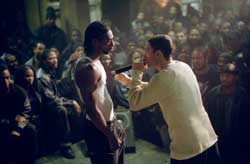
These lyrics from Eminem's freestyles at the '97 Rap Olympics show him in peak form. Much like Eddie Murphy, Robin Williams, and Whoopi Goldberg back in the 80's when they were on cocaine, Eminem was much more raw and vibrant before he cut down on the swearing and decided to sell out.
Eminem's spot at the Rap Olympics was secured by Wendy Day, after he fortuitously met her and gave her a copy of Infinite, his initially poorly received debut album. During his trip to the Rap Olympics, Eminem and his manager Paul Rosenberg gave the debut to people at Interscope Records and were finally able to generate excitement about it, securing a radio debut on the famous Wake Up Show with Sway and Tech. Dr. Dre heard this show, and the rest is history.For the following rhymes, Eminem garnered second place at the Rap Coalition's 1997 Rap Olympics. The Rap Olympics, despite colorful jokes suggested by the Chatterbox, (12 August 2002, 07:36 karmaflux wonders how Death Row Records' olympic team would do in the riflery events.) is merely a freestyle competition. Many contested the decision that Eminem received only second place, maintaining that Eminem's status as a white outsider and his bilious venom, which pissed off too many people, precluded this decision. Each break represents a different freestyle battle.
All lyrics transcribed to the best of my ability. I could not find a transcription elsewhere, so all mistakes are my own.
The MP3 of this performance is typically labelled "Eminem - '97 Rap Olympics" or "Eminem - Rap Olympics".
I would appreciate any corrections or suggestions for the garbled lyrics, as indicated by (???).
(mc: eminem go)
ha ha ha ha alright bust it
ha ha ha ha one two
ha ha ha ha alright look:
i'm going to tell you this for your own benefit
your shit was dope as hell
especially when you wrote 90% of it
what you need to do it practice on your freestyle
when you come out missing like snoop dogg's police file
(???) this shit that I'm spittin' belitt'n'
you're going to swear to god that shit was written
but it wasn't
i'll kill a dozen rappers when i'm buzzin'
guzzlin'
beat your ass like a jealous husband
next (???) north
when you go in a coma longer than (???) cut the machine off
cut the damn machine
get a clean cloth to wipe this bloody video screen off
(mic fumbling sound) (???) your weed...
(mc: you suck suck! give me that mutherfuckin' mic!)
(mc: ladies ain't first this time)
(someone in the crowd: that's fucked up!)
aight aight i never battled a female before
(mc: aight figure it out)
ha ha ha aight
i'm moving in for the kill and i got the trap set
i can tell you're wack as fuck and i ain't even heard you rap yet
look at you thinkin: i'm about to whip his ass
cuz i'm going to do some written shit
plus i get to go last
well guess what
even if i go first it's no worst
my shit still from demonic (???) verse
i'm going to slice you like a ginsu
and anything you say can and will be used against you
in the court of law
i'm short and raw
take your fucking shit and cut it off
yo! you want to be a dope MC?
look don't get mad start taking your period out on me
(mic fumbling sounds) cuz i ain't gonna...
(mc: whoa, whoa, whoa!)
(mc: eminem... thirty second, thirty seconds)
ha ha ha
aight bust it bust it bust it bust it
aight
you want to represent on the microphone
but you rap sleazily
i ain't about to battle this fake ass eazy-e
there ain't no way i'm going to do this bullshit
i don't give a fuck, i'm loaded up with a full clip
time of the month you couldn't get the (tape?) of the day
take him away
i ripped him like a papier mache
i heard you rap before you ain't about shit
this whole battle was mismatched like your outfit
try to battle me and get your mouth split
you sold out like ticketmaster outlet
ha ha i bust and i (crust?)
i don't give a fuck
ain't no way you can fuck with us
yo i'm giving back with (pimp?) shit
i'll laminate that shit in a badge and wear it at the rap olympics,
plus (millenium?) (mic fumbling sound)
(mc: whoa whoa whoa... (chuckling) slow down!)
(eminem?: DAMN!)
(mc: aight)
blah blah blah blah blah blah blah
stop babblin'
you're so fuckin' wack i'm going to walk away while you're battlin'
fuck that. i'm on a brand new solo mission
to make sure wendy day kicks you out of the rap coalition
i throw a switch at an execution
with an overdose of devotion
don't talk back i'm the dope bitch
so who you sound like on the mic
there was only one tupac
you're thug style is one big psyche
take a big hike
bitch you can't catch me
your best rhymes still ain't shit like (???)
what the fuck you wanna do?
I'll battle any MC in your crew
and i don't give a fuck, i slaughter boys
especially wack-ass MCs who will wear fake ass corduroys
(mc: damn damn damn!)
mic yo
bust it
i'm about to make this mic short circuit
(???) is wack as fuck this shit fits you perfect
i've got so many ways to diss you that i'm playful with you
i'll let a razor slit you
till they staple stitch you
and everyone in this place will miss you
if you try to turn my facial tissue into a racial issue
nobody's hearing you
you're a wack liar
damn, all your white jokes just backfired!
cuz bitch you walking up the wrong street
like (???) all your boys you were beat by a honky
i don't give a fuck i kill you
bitch you better respect me like I look familiar
anything you say I'm gonna kill you.
grill you
when i fucking drill you
(mc: alright, alright)
(someone else: eminem! eminem!)
ha ha ha ha alright bust it
ha ha ha ha one two
ha ha ha ha alright look:
i'm going to tell you this for your own benefit
your shit was dope as hell
especially when you wrote 90% of it
what you need to do it practice on your freestyle
when you come out missing like snoop dogg's police file
(???) this shit that I'm spittin' belitt'n'
you're going to swear to god that shit was written
but it wasn't
i'll kill a dozen rappers when i'm buzzin'
guzzlin'
beat your ass like a jealous husband
next (???) north
when you go in a coma longer than (???) cut the machine off
cut the damn machine
get a clean cloth to wipe this bloody video screen off
(mic fumbling sound) (???) your weed...
(mc: you suck suck! give me that mutherfuckin' mic!)
(mc: ladies ain't first this time)
(someone in the crowd: that's fucked up!)
aight aight i never battled a female before
(mc: aight figure it out)
ha ha ha aight
i'm moving in for the kill and i got the trap set
i can tell you're wack as fuck and i ain't even heard you rap yet
look at you thinkin: i'm about to whip his ass
cuz i'm going to do some written shit
plus i get to go last
well guess what
even if i go first it's no worst
my shit still from demonic (???) verse
i'm going to slice you like a ginsu
and anything you say can and will be used against you
in the court of law
i'm short and raw
take your fucking shit and cut it off
yo! you want to be a dope MC?
look don't get mad start taking your period out on me
(mic fumbling sounds) cuz i ain't gonna...
(mc: whoa, whoa, whoa!)
(mc: eminem... thirty second, thirty seconds)
ha ha ha
aight bust it bust it bust it bust it
aight
you want to represent on the microphone
but you rap sleazily
i ain't about to battle this fake ass eazy-e
there ain't no way i'm going to do this bullshit
i don't give a fuck, i'm loaded up with a full clip
time of the month you couldn't get the (tape?) of the day
take him away
i ripped him like a papier mache
i heard you rap before you ain't about shit
this whole battle was mismatched like your outfit
try to battle me and get your mouth split
you sold out like ticketmaster outlet
ha ha i bust and i (crust?)
i don't give a fuck
ain't no way you can fuck with us
yo i'm giving back with (pimp?) shit
i'll laminate that shit in a badge and wear it at the rap olympics,
plus (millenium?) (mic fumbling sound)
(mc: whoa whoa whoa... (chuckling) slow down!)
(eminem?: DAMN!)
(mc: aight)
blah blah blah blah blah blah blah
stop babblin'
you're so fuckin' wack i'm going to walk away while you're battlin'
fuck that. i'm on a brand new solo mission
to make sure wendy day kicks you out of the rap coalition
i throw a switch at an execution
with an overdose of devotion
don't talk back i'm the dope bitch
so who you sound like on the mic
there was only one tupac
you're thug style is one big psyche
take a big hike
bitch you can't catch me
your best rhymes still ain't shit like (???)
what the fuck you wanna do?
I'll battle any MC in your crew
and i don't give a fuck, i slaughter boys
especially wack-ass MCs who will wear fake ass corduroys
(mc: damn damn damn!)
mic yo
bust it
i'm about to make this mic short circuit
(???) is wack as fuck this shit fits you perfect
i've got so many ways to diss you that i'm playful with you
i'll let a razor slit you
till they staple stitch you
and everyone in this place will miss you
if you try to turn my facial tissue into a racial issue
nobody's hearing you
you're a wack liar
damn, all your white jokes just backfired!
cuz bitch you walking up the wrong street
like (???) all your boys you were beat by a honky
i don't give a fuck i kill you
bitch you better respect me like I look familiar
anything you say I'm gonna kill you.
grill you
when i fucking drill you
(mc: alright, alright)
(someone else: eminem! eminem!)
About me
- I'm WHOSANE
- From India
- My profile
